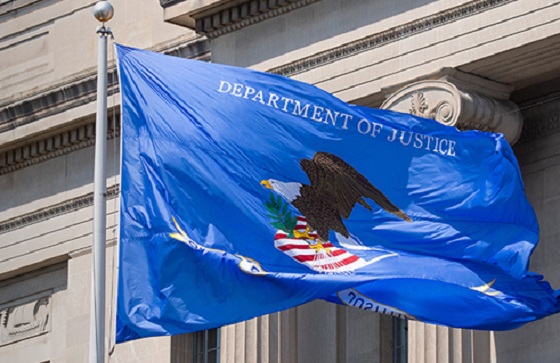espionage
Chinese spies arrested in California

From The Center Square
PRC operatives arrested in Guam during historic missile test
People’s Republic of China (PRC) and Chinese Communist Party (CCP) operatives and spies continue to be arrested in the U.S. The latest include two Chinese spies in California and several arrested in Guam near a U.S. military installation on the same day as an historic live ballistic missile interception test.
In California, a 64-year-old man was arrested on several charges including allegedly acting as a PRC agent while working as a campaign manager for a southern California city council candidate elected in 2022, according to the U.S. Department of Justice. The operative “allegedly discussed with Chinese government officials how the PRC could ‘influence’ local politicians in the United States, particularly on the issue of Taiwan” and was allegedly involved in operations “to combat ‘anti-China forces’ in the U.S., among other conspiracies.
He was also charged with conspiring with another PRC operative who was sentenced to prison last month for acting as an unregistered PRC agent and bribing an IRS agent. In that case, two PRC citizens living in Los Angeles were targeting members of the Shen Yun Performing Arts Center, a multi-agency investigation found.
In Guam, U.S. Customs officers arrested PRC citizens who illegally entered near a U.S. military installation, according to the Guam Customs & Quarantine Agency.
As part of their investigation, officers learned the PRC operatives were dropped off the coast of Guam by a vessel originating from Saipan, in the U.S. territory of the Commonwealth of the Northern Mariana Islands (CNMI).
On Dec. 10, they apprehended and detained two PRC women. On Dec. 11, they apprehended four PRC men who were all transported by the same vessel originating from Saipan, authorities said.
One PRC male was apprehended in the Tanguisson Beach area; three PRC men were apprehended in the vicinity of a U.S. military installation.
They were apprehended as the U.S. Missile Defense Agency, working with U.S. Department of Defense partners, “successfully conducted a live intercept of a ballistic missile target, marking the first Ballistic Missile Defense event executed from Guam,” the MDA announced. The operation was conducted off the coast of Andersen Air Force Base, Guam.
MDA Director Lt. Gen. Heath Collins said the successful operation enabled them to “build upon and validate joint tracking architecture and integrated air and missile defense capabilities for Guam.”
The flight test was “a critical milestone in the defense of Guam and the region,” Commander, Joint Task Force-Micronesia Rear Adm. Greg Huffman said. “It confirmed our ability to detect, track, and engage a target missile in flight, increasing our readiness to defend against evolving adversary threats.”
“Within the context of homeland defense, a top priority for the Department of Defense, Guam is also a strategic location for sustaining and maintaining United States military presence, deterring adversaries, responding to crises, and maintaining a free and open Indo-Pacific region,” MDA said.
Recognizing the threat posed by the PRC, the Guam Customs & Quarantine Agency has apprehended 152 PRC individuals “who were determined to be in violation of Guam entry laws” since 2022.
It’s also involved in a multiagency border security task force targeting illegal entries, which includes the Guam Police Department, Guam Fire Department, Guam Attorney General, Guam Port Authority, Guam Department of Labor, Guam Homeland Security, Guam Department of Agriculture Conservation Division, Marianas Fusion Center, Commonwealth of the Northern Mariana Islands Customs and Department of Public Safety, US Coast Guard, US Navy, US Customs and Border Protection, US Department of Homeland Security’s Homeland Security Investigations, and Federal Bureau of Investigations.
The task force is asking its community to contact them with any information related to illegal entry and to remain “vigilant and keep watch for individuals suspected to have made illegal entry to the island or who may be involved in smuggling activities.”
Border security and immigration law violations in the CNMI have long been a concern expressed by members of Congress, including the explosion of illegal birth tourism on the islands, The Center Square reported.
The recent PRC operatives arrests come as the greatest number of Chinese nationals illegally entered the country in U.S. history under the Biden administration, more than 176,000, The Center Square first reported.
conflict
Iran nuclear talks were ‘coordinated deception’ between US and Israel: report

From LifeSiteNews
Reports state that U.S. peace talks were a ruse and that Trump gave Netanyahu a ‘green light’ to hit Iran’s nuclear and military sites, killing top commanders.
A senior Israeli official told the Jerusalem Post that Tel Aviv and Washington worked together to convince Tehran that diplomacy was still possible after Israel was ready to attack Iran. Just hours before Israel’s massive assault began, President Donald Trump maintained he was still committed to talks.
The Israeli outlet reports, “The round of U.S.-Iranian nuclear negotiations scheduled for Sunday was part of a coordinated U.S.-Israeli deception aimed at lowering Iran’s guard ahead of Friday’s attack.”
READ: Israel strikes Iran’s nuclear sites, kills top commanders in massive air assault
In a post on Truth Social shortly before the Israeli strikes began, Trump declared that “We remain committed to a Diplomatic Resolution to the Iran Nuclear Issue! My entire Administration has been directed to negotiate with Iran. They could be a Great Country, but they first must completely give up hopes of obtaining a Nuclear Weapon. Thank you for your attention to this matter!”
After the Israeli attack was in progress, Secretary of State Marco Rubio denied that the U.S. was involved. However, American officials have said the White House was aware Israel was set to begin striking Iran, with Trump telling Fox News he was briefed on the operation.
Barak Ravid of Axios, moreover, later reported that Tel Aviv was given “a clear U.S. green light” to start bombing, citing two unnamed Israeli officials.
Sources speaking with Axios said the perceived split between Trump and Israeli Prime Minister Benjamin Netanyahu was coordinated behind the scenes. “Two Israeli officials claimed to Axios that Trump and his aides were only pretending to oppose an Israeli attack in public – and didn’t express opposition in private,” the report explained. “The goal, they say, was to convince Iran that no attack was imminent and make sure Iranians on Israel’s target list wouldn’t move to new locations.”
The sources said that Trump and Netanyahu discussed the attack during a phone call on Monday. After the call, reports said Trump pressed Netanyahu not to attack Iran, but that was another effort to deceive Iran.
In a second post following the attack, Trump said he gave Iran the opportunity to make a deal, and suggested that Israel used American weapons in the massive air raid. “I gave Iran chance after chance to make a deal. I told them, in the strongest of words, to ‘just do it,’ but no matter how hard they tried, no matter how close they got, they just couldn’t get it done,” the president wrote.
The post continued, “I told them it would be much worse than anything they know, anticipated, or were told, that the United States makes the best and most lethal military equipment anywhere in the World, BY FAR, and that Israel has a lot of it, with much more to come – And they know how to use it.”
The U.S. and Iran began negotiations on establishing a new nuclear agreement in April, with the two sides engaging in five rounds of Omani-mediated talks. At times, a deal appeared possible, with Iranian officials saying the dialogue was leading to progress. A sixth round of talks was scheduled for Sunday, but now appears unlikely.
A second source speaking with the Jerusalem Post said the goal of Israel’s military operations was not the complete destruction of Iran’s nuclear facilities, but rather to hit missile sites and top Iranian leaders to bring down the government.
Israel has conducted several rounds of strikes so far, hitting nuclear facilities, residential buildings in Tehran, and military sites. Iran has confirmed that several military leaders and nuclear scientists were killed in the bombing.
espionage
FBI Director: CCP Behind Wave of Pathogen Smuggling as Third Chinese Student Charged in Michigan Lab Probe

 Sam Cooper
Sam Cooper
“In a follow up interview with FBI and ICE HSI agents, Han admitted to sending the packages and lying about their contents”
In an intensifying pattern of national security investigations targeting unauthorized biological shipments from China into Detroit, U.S. authorities on Monday confirmed the arrest of a third Chinese national allegedly involved in smuggling undeclared bio-materials into the United States—this time for use at a University of Michigan laboratory.
“This case is part of a broader effort from the FBI and our federal partners to heavily crack down on similar pathogen smuggling operations, as the Chinese Communist Party works relentlessly to undermine America’s research institutions,” FBI Director Kash Patel posted to X on Monday evening.
The latest defendant, Chengxuan Han, is a citizen of the People’s Republic of China and a doctoral student at the College of Life Science and Technology in Wuhan. She has been charged with smuggling goods into the U.S. and making false statements, according to a federal criminal complaint filed in U.S. District Court in Detroit.
From September 2024 through March 2025, prosecutors allege, Han sent four international shipments containing concealed biological materials to individuals affiliated with a University of Michigan lab. The contents were identified as Caenorhabditis elegans — roundworms commonly used in genetic and biomedical research. The packages were mis-manifested and not declared in accordance with U.S. import regulations.
On June 8, Han arrived at Detroit Metropolitan Airport on a J-1 visa and was stopped by U.S. Customs and Border Protection officers. She allegedly denied having sent any biological materials to the U.S. and made false statements about the nature of the shipments. Agents also discovered that content on her electronic device had been deleted three days before her arrival — a detail included in the federal complaint.
“In a follow up interview with FBI and ICE HSI agents, Han admitted to sending the packages and lying about their contents,” Patel commented.
“The alleged smuggling of biological materials by this alien from a science and technology university in Wuhan, China — to be used at a University of Michigan laboratory — is part of an alarming pattern that threatens our security,” said U.S. Attorney Jerome F. Gorgon, Jr. “The American taxpayer should not be underwriting a PRC-based smuggling operation at one of our crucial public institutions.”
The case marks the third time in one week that Chinese nationals connected to the University of Michigan have been charged with allegedly smuggling undeclared biological material from China into the U.S. for laboratory research.
On June 3, federal prosecutors charged Yunqing Jian, 33, a postdoctoral fellow at the University of Michigan, and her boyfriend, Zunyong Liu, 34, with conspiracy, smuggling goods into the U.S., false statements, and visa fraud. Jian and Liu are accused of importing Fusarium graminearum — a fungus considered in some scientific literature to be a potential agroterrorism threat — into the country without proper declaration.
Officials allege Liu, who conducts research on the same pathogen at a university in China, initially lied to investigators but later admitted to smuggling the fungus for research in Jian’s Michigan lab.
The Bureau is a reader-supported publication.
To receive new posts and support my work, consider becoming a free or paid subscriber.
-

 Health20 hours ago
Health20 hours agoLast day and last chance to win this dream home! Support the 2025 Red Deer Hospital Lottery before midnight!
-

 Business2 days ago
Business2 days agoCarney’s European pivot could quietly reshape Canada’s sovereignty
-

 conflict1 day ago
conflict1 day ago“Evacuate”: Netanyahu Warns Tehran as Israel Expands Strikes on Iran’s Military Command
-

 Aristotle Foundation23 hours ago
Aristotle Foundation23 hours agoThe Canadian Medical Association’s inexplicable stance on pediatric gender medicine
-

 Alberta2 days ago
Alberta2 days agoAlberta’s grand bargain with Canada includes a new pipeline to Prince Rupert
-

 Energy1 day ago
Energy1 day agoCould the G7 Summit in Alberta be a historic moment for Canadian energy?
-

 Crime1 day ago
Crime1 day agoMinnesota shooter arrested after 48-hour manhunt
-

 Bruce Dowbiggin1 day ago
Bruce Dowbiggin1 day agoWOKE NBA Stars Seems Natural For CDN Advertisers. Why Won’t They Bite?






